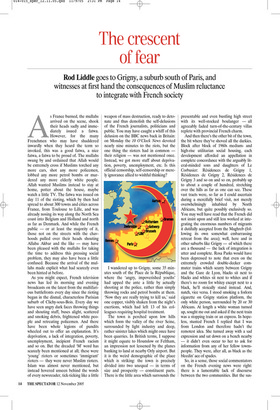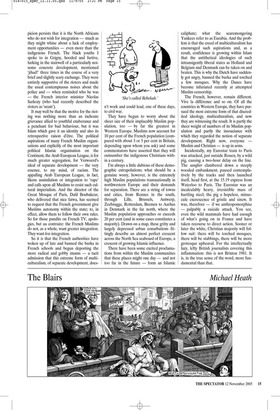The crescent of fear
Rod Liddle goes to Grigny, a suburb south of Paris, and witnesses at first hand the consequences of Muslim reluctance to integrate with French society As France burned, the mullahs arrived on the scene, shook their heads sadly and immediately issued a fatwa. However, for the many Frenchmen who may have shuddered inwardly when they heard the term so invoked, this was a good fatwa, a nice fatwa, a fatwa to be proud of. The mullahs swung by and ordained that Allah would be extremely cross if Muslims torched any more cars, shot any more policemen, lobbed any more petrol bombs or murdered any more elderly white people. Allah wanted Muslims instead to stay at home, potter about the house, maybe watch a little TV. The fatwa was issued on day 11 of the rioting, which by then had spread to about 300 towns and cities across France, from Toulouse to Lille, and was already nosing its way along the North Sea coast into Belgium and Holland and north as far as Denmark. And while the French public — or at least the majority of it, those not on the streets with the chavhoods pulled over their heads shouting Allahu Akbar and the like — may have been pleased with the mullahs for taking the time to address this pressing social problem, they may also have been a little confused. Because the arrival of the mullahs made explicit what had scarcely even been hinted at before.
As you might expect, French television news has led its morning and evening broadcasts on the latest from the multifarious battlefronts every day since the rioting began in the dismal, characterless Parisian suburb of Clichy-sous-Bois. Every day we have seen angry dark faces throwing things and shouting stuff, buses alight, scattered and smoking debris, frightened white people and retreating policemen. And there have been whole legions of pundits wheeled out to offer an explanation. It’s deprivation, a lack of integration, poverty, unemployment, incipient French racism and so on. But the dreaded ‘M’ word has scarcely been mentioned at all; these were ‘young’ rioters or sometimes ‘immigrant’ rioters — they were never Muslim rioters. Islam was almost never mentioned, but instead hovered unseen behind the words of every newsreader, tick-ticking like a little weapon of mass destruction, ready to detonate and thus demolish the self-delusions of the French journalists, politicians and public. You may have caught a whiff of this delusion on the BBC news back in Britain: on Monday the 10 O’Clock News devoted nearly nine minutes to the riots, but the one thing the rioters had in common their religion — was not mentioned once. Instead, we got more stuff about deprivation, poverty, unemployment, etc. Is this official censorship, self-censorship or merely ignorance allied to wishful thinking?
I wandered up to Grigny, some 35 minutes south of the Place de la République, where the ‘angry, impoverished youths’ had upped the ante a little by actually shooting at the police, rather than simply throwing rocks and petrol bombs at them. ‘Now they are really trying to kill us,’ said one copper, visibly shaken from the night’s exertions, which had left 13 of his colleagues requiring hospital treatment.
The town is perched upon low hills which form the valley of the river Seine, surrounded by light industry and deep, rather sinister lakes which might once have been quarries. In British terms, I suppose it might equate to Hounslow or Feltham, an impression not lessened by the planes banking to land at nearby Orly airport. But it is the weird demographic of the place which is striking: the town is precisely divided into two unequal — in terms of size and prosperity — constituent parts. There is the little area which surrounds the presentable and even bustling high street with its well-stocked boulanger — all agreeably faded turn-of-the-century villas replete with provincial French charm.
And then there’s the other bit of the town, the bit where they’ve shoved all the darkies. Block after block of 1960s mediumand high-rise utilitarian social housing, each development afforded an appellation in complete concordance with the arguably literal-minded sons and daughters of Le Corbusier: Résidences de Grigny 1, Résidences de Grigny 2, Résidences de Grigny 3 and so on and so on, probably up to about a couple of hundred, stretching over the hills as far as one can see. These vast tracts were, so far as I could ascertain during a mercifully brief visit, not merely overwhelmingly inhabited by North Africans, but quite possibly exclusively so. You may well have read that the French did not insist upon and still less worked at integrating the enormous numbers of migrants it dutifully accepted from the Maghreb (following its own somewhat embarrassing retreat from the area); well, here and in other suburbs like Grigny — of which there are a thousand — the lack of integration is utter and complete. Rosa Parks would have been depressed to note that even on the extremely crowded double-decker commuter trains which scurry between Grigny and the Gare de Lyon, blacks sit next to blacks and whites sit next to whites and if there’s no room for whitey except next to a black, he’ll stoically stand instead. And, natch, vice versa. I stood smoking a forlorn cigarette on Grigny station platform, the only white person, surrounded by 20 or 30 Africans. At length a white woman turned up, sought me out and asked if the next train was a stopping train or an express. In hopeless, stunted French I replied that I was from London and therefore hadn’t the remotest idea. She turned away with a sad expression and sat down on a bench nearby — it didn’t even occur to her to ask for information from any of her fellow townspeople. They were, after all, as black as the bleedin’ ace of spades.
So, in a sense, those social commentators on the French evening news were right: there is a lamentable lack of discourse between the two communities. But the sus picion persists that it is the North Africans who do not wish for integration — much as they might whine about a lack of employment opportunities — even more than the indigenous French. The black youths I spoke to in Grigny, hooded and furtive, lurking in the stairwell of a particularly noisome concrete development, mentioned ‘jihad!’ three times in the course of a very brief and slightly scary exchange. They were entirely supportive of the rioters and made the usual contemptuous noises about the police and — when reminded who he was — the French interior minister Nicolas Sarkozy (who had recently described the rioters as ‘scum’).
It may well be that the motive for the rioting was nothing more than an inchoate grievance allied to youthful exuberance and a penchant for bad behaviour, but it was Islam which gave it an identity and also its retrospective raison d’être. The political aspirations of many French Muslim organisations and explicitly of the most important political Islamic organisation on the Continent, the Arab European League, is for much greater segregation, for Verwoerd’s ideal of separate development — the very essence, to my mind, of racism. The appalling Arab European League, in fact, likens assimilation or integration to ‘rape’ and calls upon all Muslims to resist such cultural imperialism. And the director of the Great Mosque of Paris, Dalil Boubakeur, who delivered that nice fatwa, has seemed to request that the French government give Muslims autonomy within the state; to, in effect, allow them to follow their own rules. So for those pundits on French TV, apologies, but au contraire: the French Muslims do not, as a whole, want greater integration. They want less integration.
So it is that the French authorities have woken up of late and banned the burka in French schools and begun deporting the more radical and gobby imams — a tacit admission that this extreme form of multiculturalism, of separate development, does n’t work and could lead, one of these days, to civil war.
They have begun to worry about the sheer size of their implacably Muslim population, too — by far the greatest in Western Europe. Muslims now account for 10 per cent of the French population (compared with about 3 or 5 per cent in Britain, depending upon whom you ask) and some commentators have asserted that they will outnumber the indigenous Christians within a century.
I’m always a little dubious of these demographic extrapolations; what should be a genuine worry, however, is the extremely high Muslim populations transnationally in northwestern Europe and their demands for separation. There are a string of towns and cities, from Rennes in the south, through Lille, Brussels, Antwerp, Zeebrugge, Rotterdam, Bremen to Aarhus in Denmark in the far north, where the Muslim population approaches or exceeds 20 per cent (and in some cases constitutes a majority). Drawn on a map, these gritty and largely depressed urban conurbations fittingly describe an almost perfect crescent across the North Sea seaboard of Europe, a crescent of growing Islamic influence.
There have been some excited proclamations from within the Muslim communities that these places might one day — and not too far in the future — form an Islamic caliphate; what the scaremongering Yankees refer to as Eurabia. And the problem is that the creed of multiculturalism has encouraged such aspirations and, as a result, confidence is growing within Islam that the antithetical ideologies of such intransigently liberal states as Holland and Belgium and Denmark can be taken on and beaten. This is why the Dutch have suddenly got angry, banned the burka and torched a few mosques. Why the Danes have become infuriated recently at attempted Muslim censorship.
The French, however, remain different. Vive la différence and so on. Of all the countries in Western Europe, they have pursued the most extreme form of that discredited ideology, multiculturalism, and now they are witnessing the result. It is partly the sheer weight of numbers of its Muslim population and partly the insouciance with which they regarded the notion of separate development. Right now, everyone Muslim and Christian — is up in arms.
Incidentally, my Eurostar train to Paris was attacked, just outside Rouen, by a wild pig, causing a two-hour delay on the line. The sanglier clambered down a steeply wooded embankment, paused contemplatively by the tracks and then launched itself, head first, at the 15.19 express from Waterloo to Paris. The Eurostar was an incalculably heavy, irresistible mass of hurtling steel; the pig a hopeless, minuscule excrescence of gristle and sinew. It was, therefore — if we anthropomorphise — palpably a suicide attack. You see, even the wild mammals have had enough of what’s going on in France and have taken recourse to direct action. Sooner or later the white, Christian majority will follow suit: there will be torched mosques, there will be stabbings, there will be more grotesque upheaval. For the intellectually lazy, lefty British journalists covering this inflammation: this is not Brixton 1981. It is, in the true sense of the word, more fundamental than that.




























































 Previous page
Previous page